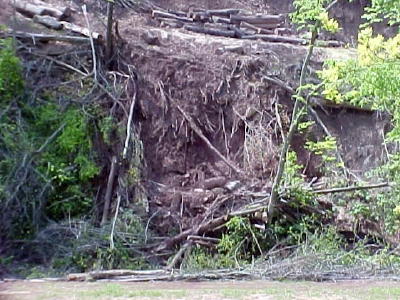
Photo, one of more than 20, taken after logger left site
on Barnes Run, showing debris and mud pushed into creek,
a site still causing erosion problems three years later
By Bob Weaver
Loggers following the state's "best practices" are not consistent, creating major environmental problems.
Most local loggers, particularly those who have been in business for some time, appear to be following "best practices" within reasonable limits.
However, site visits around Calhoun clearly show problems, many of which have caused streams to become muddy after the slightest rain.
There is evidence that some loggers illicitly used the ice storm to get around best practices.
Still, the way state forester Randy Dye sees it, the timber industry takes good care of the environment.
"We're making a lot of good progress of caring for the environment," said Dye, who heads the West Virginia Division of Forestry.
Nature Conservancy administrator Dave Saville says the state leads the nation in topsoil loss. He blames logging, agriculture and surface mining.
Saville says one problem is that following the best practices is voluntary on private land, creating huge abuse.
"The law is weak and fragmented," he said.
Because the state doesn't enforce sediment control rules, sediment gets into streams and the loss of nutrient-rich topsoil will eventually make logging unsustainable.
Dye's forestry agency has a two-fold mission, which some conservationists say is much too conflicting - promoting forest growth and timbering and being in charge of enforcement.
Enforcement, since Arch Moore was governor, has been fragmented among many different agencies.
The Hur Herald, investigated enforcement of timber laws by the state agency in the Parkersburg District in 2003.
The division was unresponsive to public information requests, after which the Freedom of Information act was used to obtain the information.
The Division of Forestry issued just two tickets with attached fines in a ten county area, following 700 "investigations," although several were issued suspension orders.
Despite the hundreds of logging operations, several of them being fly-by-nights from out of state, a number of operators continued to log after their permits were suspended.
Some loggers in Calhoun used stream beds for their operations, while others blocked county roads with logs.
Re-seeding of log paths was done on areas close to the highway, apparently a requirement, leaving hundreds of paths with erosion evidence.
Unfortunately, logging is in a slump, with market forces creating financial strain.
See LOGGERS FOLLOWING GOOD PRACTICES - Report Issued After Freedom Of Information Request
| 


